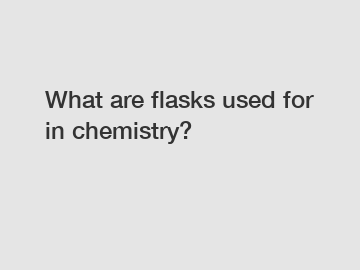What are flasks used for in chemistry?
If you've ever taken a chemistry class or worked in a laboratory, you're probably familiar with flasks. These versatile pieces of glassware are essential for conducting a wide range of chemical reactions and experiments. In this article, we'll explore what flasks are used for in chemistry and why they're so important.
What are flasks?
Flasks are typically made of borosilicate glass and come in a variety of shapes and sizes, such as round-bottom, flat-bottom, and Erlenmeyer flasks. They have a narrow neck and a wider body, which allows for easy mixing and pouring of liquids. Flasks also have measurements marked on the side, making it easy to accurately measure substances.

What are flasks used for in chemistry?
1. Mixing solutions.
One of the primary uses of flasks in chemistry is for mixing solutions. The wide body of the flask allows for thorough mixing of liquids, while the narrow neck prevents splashing or spillage. Whether you're creating a new chemical compound or conducting a titration, a flask is essential for ensuring proper mixing of ingredients.
2. Heating chemicals.
Flasks are also used for heating chemicals during experiments. The borosilicate glass is able to withstand high temperatures without cracking or shattering, making it ideal for heating substances over a Bunsen burner or hot plate. The flat or round bottom of the flask ensures even distribution of heat, allowing for precise control of the reaction.
3. Distillation.
Another common use of flasks in chemistry is for distillation. Distillation is a process used to purify liquids by separating them based on their boiling points. Flasks are often used as the receiving flask during distillation, collecting the purified liquid as it condenses and drips down the condenser.
4. Storage.
Flasks are not only used during experiments but also for storage of chemicals and solutions. The secure lid of a flask helps prevent evaporation or contamination of the substance inside. Flasks are often labeled with the name of the chemical and the date it was prepared, ensuring proper organization and identification of stored solutions.
Why are flasks important in chemistry?
Flasks play a crucial role in the field of chemistry for their versatility, durability, and convenience. Without flasks, it would be challenging to mix solutions, heat chemicals, perform distillations, or store substances in a safe and organized manner. Flasks are a fundamental piece of laboratory equipment that every chemist relies on for conducting experiments and research.
In conclusion, flasks are essential tools in chemistry for a wide range of purposes, including mixing solutions, heating chemicals, distillation, and storage. Their unique design and durable materials make them indispensable in any laboratory setting. Next time you're in the lab, take a moment to appreciate the humble flask and all the ways it helps facilitate your experiments.
If you're in need of high-quality flasks for your laboratory, don't hesitate to contact us. As a reputable supplier of laboratory equipment, we offer a wide selection of flasks to meet your needs. Get in touch with us today to learn more about our products and services.
Want more information on t-25 flask, pipette maintenance, flask t25? Feel free to contact us.



